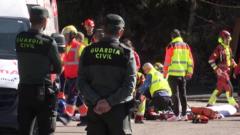This article explores the compassionate efforts of Spanish police women, particularly Cristina and her unit, as they provide long-term support and care for sex trafficking victims like "Victoria". Through a victim-focused approach, they not only rescue individuals but also help reintegrate them into society.
Women Police Officers Forge Lifelong Bonds With Sex Trafficking Survivors

Women Police Officers Forge Lifelong Bonds With Sex Trafficking Survivors
Spanish police build enduring relationships with the trafficking victims they rescue, providing unwavering support.
Cristina and Lidia, members of an elite Spanish police unit, have been instrumental in supporting victims of sex trafficking, exemplified by their relationship with "Victoria", a survivor of extreme abuse. Victoria's journey began in Colombia, where a desperate need to support her family led her to Spain under false pretenses, ultimately finding herself trapped in a life of forced prostitution.
After her rescue, Cristina and her team became vital figures in Victoria's life, aiding her psychological recovery and helping to reunite her with her children, whom traffickers had threatened. This relationship underscores the unit’s commitment to a victim-centered approach, moving beyond mere law enforcement to foster healing and stability.
In Spain, women constitute a significant presence within law enforcement, making up 60% of Cristina's team. This gender ratio is not just a statistic; it correlates with an enhanced trust and comfort level among female victims regarding reporting their traumas.
The UNODC reports that around 50,000 victims of trafficking are identified globally each year, a number that has surged during the pandemic. As detection methods become more complex and cases more hidden, the importance of supportive relationships like those exemplified by Cristina and her team become crucial in restoring hope and freedom to survivors like Victoria.
Victoria now leads a new life, cherishing her freedom and expressing gratitude for her second chance. Through Cristina's unwavering belief in her resilience, they represent a tiny flicker of hope in a dark world where many remain trapped and unseen.
After her rescue, Cristina and her team became vital figures in Victoria's life, aiding her psychological recovery and helping to reunite her with her children, whom traffickers had threatened. This relationship underscores the unit’s commitment to a victim-centered approach, moving beyond mere law enforcement to foster healing and stability.
In Spain, women constitute a significant presence within law enforcement, making up 60% of Cristina's team. This gender ratio is not just a statistic; it correlates with an enhanced trust and comfort level among female victims regarding reporting their traumas.
The UNODC reports that around 50,000 victims of trafficking are identified globally each year, a number that has surged during the pandemic. As detection methods become more complex and cases more hidden, the importance of supportive relationships like those exemplified by Cristina and her team become crucial in restoring hope and freedom to survivors like Victoria.
Victoria now leads a new life, cherishing her freedom and expressing gratitude for her second chance. Through Cristina's unwavering belief in her resilience, they represent a tiny flicker of hope in a dark world where many remain trapped and unseen.



















